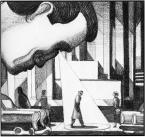The Sweetest Days by John Hough Jr., Gallery Books, 2021, 352 pages, $27.
Peter Hatch, former Cape Cod high school football star and later speechwriter for a senator, has written a Washington-based political thriller, The Minutes of This Night, and returned with his wife Jackie to his hometown where he’s scheduled to give a reading at the local bookshop. But what might have been a purely happy occasion is darkened by the fact that Jackie has recently received a cancer diagnosis with a sobering survival rate.
The diagnosis heightens what already seems like an unhealthy amount of tension between Peter and Jackie. When Peter visits a liquor store on their way, for instance, he randomly meets a woman named Rita Clare, and despite the fact that they have a purely surface-level, one-minute chat, Jackie is seething with jealousy when he gets back to the car.
The evening’s disaster becomes complete when the already-failing reading is crashed by Adrian Denton, Peter’s high school nemesis. Peter had been briefly in love with Adrian’s cousin, Corinna, decades ago, and Peter had been at the wheel when a car crash took her life — for which Adrian has never forgiven him.
“Trouble had shown up,” the reader is told when Adrian enters the bookstore, “and everyone sensed it as Denton stood there, just inside the door, not quite smiling but almost, looking first at me, then at Jackie, and on around the room.”
Adrian is shown out, the paltry gathering disperses, and Peter tries to share a bit of his own insecurity as a writer with Jackie. He’s certain that this debacle signals that he’s not destined to be a great writer like Dickens, whose works show a “heightened, exciting world.”
This comment of Peter’s happens after a very long flashback in the middle section of the book dealing with his home life, his love life, his romantic dreams and the growth of his mind. Ordinarily, long flashbacks in the middle of tense narratives are the kiss of death for dramatic momentum, but Mr. Hough writes everything with a crisp narrative snap that never fails to be interesting. His characters are not the pasteboard saints found in so much contemporary fiction. Rather, they have plenty of flaws and shortcomings.
Much of the book engages in this way with creative issues that have only been sharpened by the 21st century. All across the storytelling spectrum — not just novels but movies, comic books, cable dramas and TV shows — have embraced the concept of “subverting expectations,” where creators know what audiences expect of their work and very intentionally don’t provide it.
Almost every character in Hough’s novel is fascinating, multi-layered and often unpredictable. The result feels like the cross-hatched texture of real life, and it leaves the reader fired up but fundamentally unsure where to put all that energy.
That’s an uncomfortable feeling, but it’s also exhilarating. It might not be a beautiful illusion, but it’s most certainly a heightened, exciting world.







Comments
Comment policy »